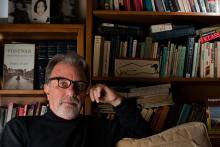By William Sweet
With concerns rampant over the collapsing value of the euro, a lauded resource for understanding the European Union has just received a timely update from its coeditor Ronald Tiersky, the Joseph B. Eastman ’04 Professor of Political Science.
 Professor of Political Science. |
The fourth edition of Europe Today: A Twenty-First Century Introduction (Rowman & Littlefield) is out just in time for the fall semester and Tiersky’s course at Amherst, “Contemporary Europe.” In the book’s introduction, Tiersky and his coeditor, Erik Jones, professor of European studies at the Johns Hopkins School of Advanced International Studies in Bologna, Italy, write that hefty challenges involving immigration, economic downturns and the pressures of globalization will increasingly put the hard-fought European Union to the test.
“Europe is at a crossroads again, and European integration as a whole is in danger,” Tiersky said, making note of the current debt crisis in the euro zone countries.
“Will the Germans agree to bail out everybody? Will German taxpayers allow [Chancellor] Angela Merkel to do that? The euro, for the moment, is the crown jewel of European integration,” he said. “Will the solution be more Europe or less Europe—which is to say, deeper integration or a return to national solutions?”
To examine the issues, Tiersky and Jones enlisted a team of experts from schools including Rutgers University, Kent State University, the University of Massachusetts Amherst, the University of Bologna, Maastricht University and the London School of Economics. “It is extremely difficult to write a good textbook,” Tiersky noted. “In this series, we’ve been lucky enough to have really first-rate people who write in a textbook as a kind of public service.”
Tiersky first outlined the concept of this book (which has grown into a series since its first edition 20 years ago, most recently including last year’s European Foreign Policies: Does Europe Still Matter?) as an alternative to standard textbook surveys of the European geopolitical scene.
“As opposed to other textbooks, which give a general framework—‘These are the political parties; this is how a law is passed in Norway’—this is a book of analysis and analytic point of view,” he said. Rather than try to present a neutral overview, he invited the authors to present their opinions. “With 12 or 13 authors, this means that we have many different points of view. Let’s take that risk. That’s what makes this book different and unique,” he said.
The contents examine individual countries, including Great Britain, Germany, Italy and Poland, and analyze issues such as the economic crisis, politics and immigration. What emerges, as Tiersky sees it, is the question, “Is Europe an exhausted civilization?”
“It’s perfectly conceivable that Europe is a new case of the rise and decline of a kind of empire,” Tiersky said. He believes there’s still a chance the Europeans may pull together and pull out of the morass, but it’s still just a chance.
“Europe is no longer at the center of the world order, and the European peoples seem to be accepting it,” he said. “[But] they’re trying to maintain their own standards of living and then pull the ladder up. As in America … their children are going to have to pay the taxes to finance their retirements.”
Europe and the United States, with their shared traditions and history, may have lessons to learn in common. Both are accustomed to being leading empires, and both may have to make way for other nations to take the lead, he said. “It used to be a kind of cautionary note, but today it’s pretty clear that American preeminence is not forever, and we learn that from Europe. The question is whether Americans will accept relative decline or find a renewed ambition for prosperity, for being the society that gets things done.”
In the end, everything comes down to the people --of any country-- wanting to come together and effect change, he said. “The president can be optimistic and so on, but if the people don’t want it there’s nothing you can really do about it.”